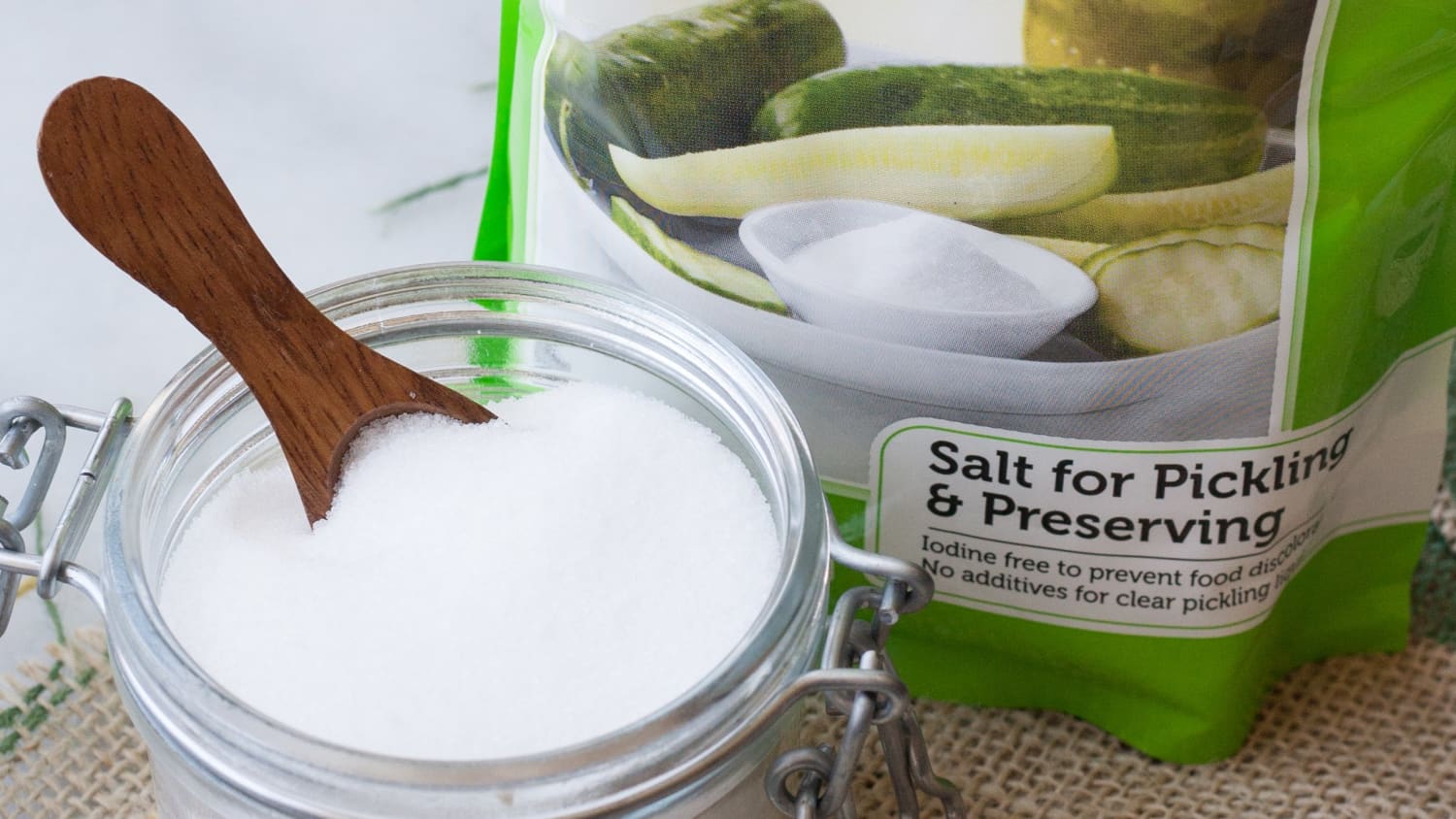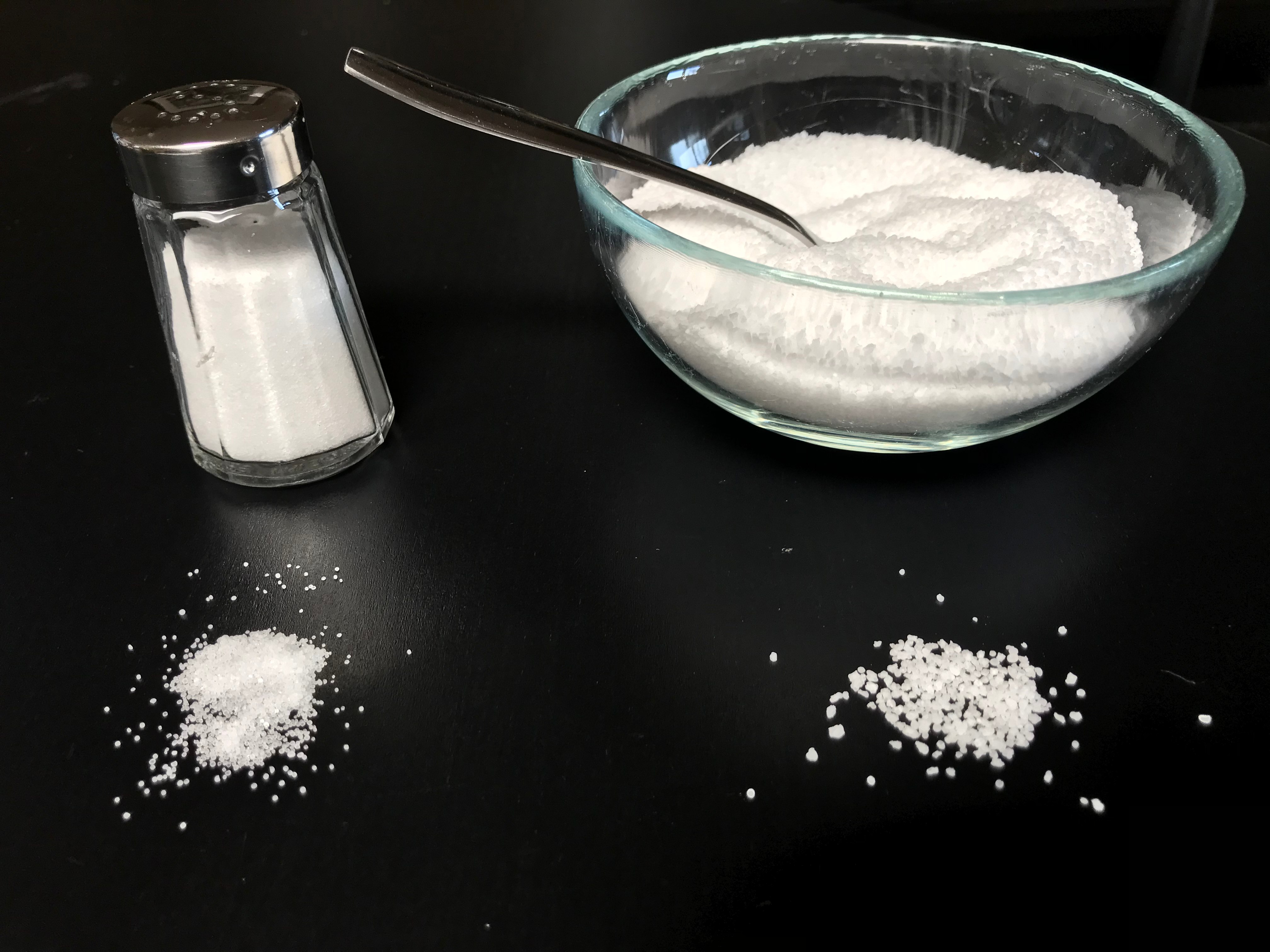
Pickling salt has small uniform granules with more or less regular shapes. 395 785 Views.

It is the product of an industrial process that uses chemicals and high temperatures to remove all the trace minerals naturally occurring in the sea or earth.
Difference between pickling salt and kosher salt. How does pickling salt differ from kosher salt. One of the most obvious differences between pickling and kosher salts is the size and shape of the particles. Pickling salt has small uniform granules with more or less regular shapes.
The biggest difference between pickling salt and Kosher salt is their salt crystal size. In fact the pickling salt crystals are small uniform and smooth. Meanwhile Kosher salt crystals are larger in size.
Pickle salt and kosher salt both have special uses. Canning salt is a great choice for the pickling process. Kosher salt does not dissolve easily in small amounts of liquids which is why it is not suitable for baking where there are no wet ingredients.
Kosher Salt vs Pickling Salt Pickling salt is fine grained whereas kosher salt is coarse grained. The crystals of pickling salt are even whereas they are irregular shape in kosher salt. Kosher salt grains have a large surface area.
It is very flaky and adheres easily to food surfaces while coarse pickling salts only real difference from kosher salt is that some brands of kosher salt contain anti-caking additives while coarse pickling salt never contains these. Pickling or canning salt is a fine-grained salt used for processing pickles and for canning food. As you prepare food to be canned or pickled this salt prevents the brine from getting cloudy.
All the hard work of grinding up kosher or sea salt has been done. Pickling or canning salt is used for manufacturing and canning pickles. The only difference between pickling salt and kosher salt is the size of the granule.
Kosher salt usually has coarser grains compared to pickling salt which allows for more air space between each grain. This means a tablespoon of kosher salt will contain less salt than a tablespoon of pickling salt which can be a problem if you are following. The volume is different than table salt so be careful if you try to substitute one for the other using precise measurements 1 teaspoon of kosher salt wont give the same level of saltiness.
The one exception to this is kosher salt. Is commonly interchanged with pickling salt because most are also pure salt with no additives or anti-caking agentsNote. A few brands of kosher salt DO have other ingredients so always check the label if you want a clear brine.
It should only say salt and nothing else And if you can find a fine grain kosher salt all the. 395 785 Views. 24 Votes The difference between pickling salt and standard table salt is that pickling salt does not contain anti-caking ingredients.
Anti-caking ingredients found in salt prevent the salt granules from clumping together and or liquifying as easily in moist or humid conditions. Click to read full detail here. Kosher salt can be used as a substitute for pickling salt so long as it doesnt contain any anti-caking agents this can vary from brand to brand.
Since kosher salt has a different grain size than pickling salt you will have to adjust the measurements when substituting one for the other. The Difference Between Kosher Table and Sea Salts. The Not completely accurate with the claim kosher salt contains less sodium per ounce than table or sea salt.
With the exception of the slight very slight variations in the amount and type of impurity in a particular salt anything other than Na or Cl all should have the same amount of. Kosher salt is extremely pure salt. It does not contain iodine.
It is a great alternative as long as it is pure salt without any additives. It is not refined and is basically a type of coarse salt. The New Angle On Difference between Canning Salt and Kosher Salt Just Released.
For pickling and canning most individuals prefer to use pickling. Kosher salt grains have a large surface area. It is very flaky and adheres easily to food surfaces while coarse pickling salts only real difference from kosher salt is that some brands of kosher salt contain anti-caking additives while coarse pickling salt never contains these.
Pickling Salt vs Sea Salt. Sea salt can be used as a canning salt substitute because it contains no additives. There are fine sea salts and coarse sea salts on the market so use this common conversion for accuracy.
1 tsp of pickling salt 1 tsp of fine sea salt. 12 cups of pickling salt 12 cup 2 teaspoons of fine sea salt. Furthermore is there a difference between canning salt and kosher salt.
Pickling salt has small uniform granules with more or less regular shapesKosher salt consists of larger irregularly shaped flakesKosher salt crystals are flatter than rather than the block-like pickling salt crystals. Pickling salt and kosher salt both have specialized uses. You may know it as table salt sea salt kosher salt or pickling salt.
However few people realize that this saltlike our sugars flours and vegetable oilsis highly refined. It is the product of an industrial process that uses chemicals and high temperatures to remove all the trace minerals naturally occurring in the sea or earth. Depending on the weight of the kosher salt you are using you can generally substitute it at one cup plus two tablespoons for one cup of pickling salt also known as canning salt.
Kosher and pickling salts have no additives like iodine or anti-clumping agents and they are a purer form of salt. Pickling salt has small uniform granules with more or less regular shapesKosher salt consists of larger irregularly shaped flakesKosher salt crystals are flatter than rather than the block-like pickling salt crystalsPickling salt and kosher salt both have specialized uses.